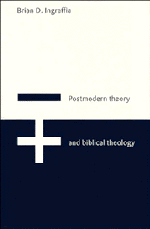Book contents
- Frontmatter
- Contents
- Acknowledgements
- List of abbreviations
- Note on translations of the Bible
- Introduction: postmodernism, ontotheology, and Christianity
- 1 NIETZSCHE'S MOCKERY: THE REJECTION OF TRANSCENDENCE
- 1 The death of God: loss of belief in the Christian God as the cause of nihilism
- 2 Vanquishing God's realm: Nietzsche's abolition of the true world
- 3 Nietzsche on the Judaeo-Christian denial of the world
- 4 The redemptive–eschatological separation between the present world and the world to come in the New Testament
- 5 On redemption: the eternal return or biblical eschatology
- II HEIDEGGER'S FORGETTING: THE SECULARIZATION OF BIBLICAL ANTHROPOLOGY
- III DERRIDA'S DENIALS: THE DECONSTRUCTION OF ONTOTHEOLOGY
- Conclusion: ontotheology, negative theology, and the theology of the cross
- Notes
- Bibliography
- Index
1 - The death of God: loss of belief in the Christian God as the cause of nihilism
Published online by Cambridge University Press: 01 June 2011
- Frontmatter
- Contents
- Acknowledgements
- List of abbreviations
- Note on translations of the Bible
- Introduction: postmodernism, ontotheology, and Christianity
- 1 NIETZSCHE'S MOCKERY: THE REJECTION OF TRANSCENDENCE
- 1 The death of God: loss of belief in the Christian God as the cause of nihilism
- 2 Vanquishing God's realm: Nietzsche's abolition of the true world
- 3 Nietzsche on the Judaeo-Christian denial of the world
- 4 The redemptive–eschatological separation between the present world and the world to come in the New Testament
- 5 On redemption: the eternal return or biblical eschatology
- II HEIDEGGER'S FORGETTING: THE SECULARIZATION OF BIBLICAL ANTHROPOLOGY
- III DERRIDA'S DENIALS: THE DECONSTRUCTION OF ONTOTHEOLOGY
- Conclusion: ontotheology, negative theology, and the theology of the cross
- Notes
- Bibliography
- Index
Summary
The greatest recent event – that “God is dead,” that the belief in the Christian god has become unbelievable – is already beginning to cast its first shadows over Europe … The event itself is far too great, too distant, too remote from the multitude's capacity for comprehension even for the tidings of it to be thought of as having arrived as yet. Much less may one suppose that many people know as yet what this event really means.
Nietzsche, The Gay ScienceThis reading of Nietzsche attempts to take seriously his critique and rejection of Christianity. There has been a strong tendency in Nietzsche criticism, especially since Heidegger, to ignore or, at least, to diminish the importance of Nietzsche's indictment of Christianity. There are several strategies and rationales for doing so.
One of the oldest strategies for avoiding an analysis of Nietzsche's denunciation of Christianity illustrates the triumph of his attack. Nietzsche describes in The Gay Science how a change in intellectual “taste” is brought about:
What changes the general taste? The fact that some individuals who are powerful and influential announce without any shame, hoc est ridiculum, hoc est absurdum, in short, the judgement of their taste and nausea; and then they enforce it tyrannically.
(GS 39)Later in this same work he applies this principle to Christianity: “Against Christianity. – What is now decisive against Christianity is our taste, no longer our reasons” (GS 132).
- Type
- Chapter
- Information
- Postmodern Theory and Biblical TheologyVanquishing God's Shadow, pp. 19 - 32Publisher: Cambridge University PressPrint publication year: 1995



